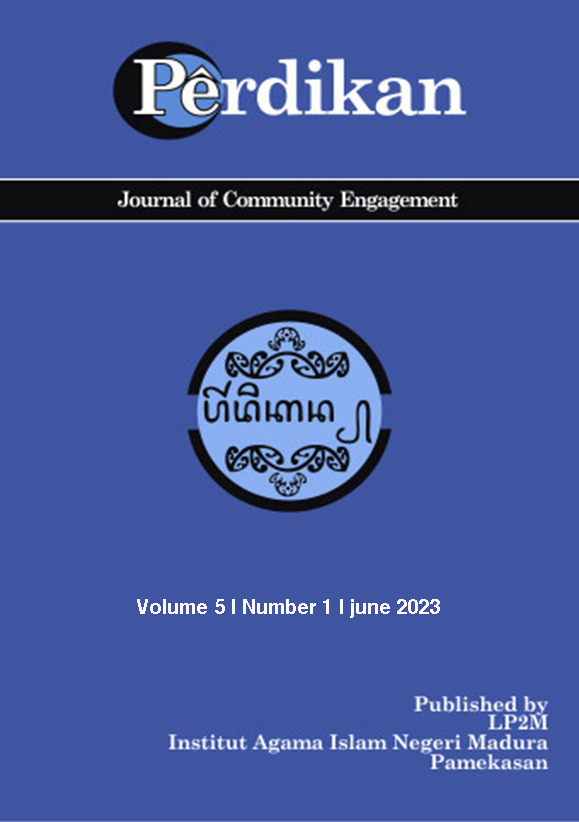Sekolah kader nazir wakaf sebagai model regenerasi dan peningkatan profesionalitas nazir NU Kabupaten Banyumas
 Abstract views: 348
,
Abstract views: 348
,
 PDF downloads: 258
PDF downloads: 258
Abstract
The duties of the Waqf nazir (waqf manager) are as stated in article 11 of Law no. 41 of 2004 concerning Waqf, namely administering, managing and developing, supervising and protecting waqf assets, even providing a report on the implementation of tasks to the BWI (Badan Wakaf Indonesia). However, the reality shows that some nazir's tasks have not been or have not been carried out properly and professionally. The lack of understanding of nazir's duties and the professionalism of his performance has resulted in waqf assets not being properly inventoried, waqf land certification not being optimal, resulting in the possession of waqf assets by third parties. This community service was based on a community development approach that aimed at increasing the capacity and ability of nazirs to understand their duties and authorities in managing waqf assets. This community service aimed to increase the professionalism of the waqf nazir of Nahdlatul Ulama in managing waqf assets. The results achieved in this service were the achievement of professional NU waqf nazir performance in managing waqf assets, producing potential loyal and professional nazir waqf cadres, and providing nazir understanding and skills in utilizing technology in the form of digitizing and integrating waqf data through the System application Information Waqf (SIWAK) and SIWAKNU.
(Tugas nazir wakaf sebagaimana tercantum pada pasal 11 UU No. 41 Tahun 2004 tentang wakaf adalah mengelola dan mengembangkan, mengawasi serta melindungi harta benda wakaf. Nazir wakaf juga bertugas memberikan laporan tentang pelaksanaan tugas kepada Badan Wakaf Indonesia. Akan tetapi, kenyataan menunjukkan bahwa beberapa tugas nazir belum atau tidak dilaksanakan dengan baik dan profesional. Rendahnya pemahaman tugas nazir dan profesionalitas kinerjanya menyebabkan harta benda wakaf tidak terinventarisir dengan baik, sertifikasi tanah wakaf tidak optimal berakibat pada penguasaan harta benda wakaf oleh pihak ketiga. Pendekatan dalam pengabdian ini mendasarkan pada pendekatan community development yaitu kegiatan pengembangan masyarakat yang diarahkan untuk meningkatkan kapasitas dan kemampuan nazir dalam memahami tugas dan kewenangannya dalam mengelola harta benda wakaf. Tujuan pengabdian masyarakat ini adalah meningkatkan profesionalitas nazir wakaf NU dalam mengelola harta benda wakaf. Hasil yang dicapai dalam pengabdian ini adalah tercapainya kinerja nazir wakaf NU yang profesional dalam mengelola harta benda wakaf, menghasilkan kader kader nazir wakaf potensial yang loyal dan profesional, dan memberikan pemahaman dan keterampilan nazir dalam pemanfaatan teknologi berupa melakukan digitalisasi dan integrasi data wakaf melalui aplikasi Sistem Informasi Wakaf (SIWAK) Kementerian Agama, Wakaf Uang NU dan SIWAKNU).
Downloads
References
Abdullah, A. (2020). Nadzir dalam Perspektif Kelembagaan Wakaf di Indonesia. Jurnal Ilmiah Ekonomi Islam, 6(3), 403–408. http://dx.doi.org/10.29040/jiei.v6i3.1216
Fauziyyah, N., & Umami, K. (2021). Efektifivitas Tata Kelola Wakaf Nazir Organisasi (Pengalaman Majelis Wakil Cabang Nahdlatul Ulama Kecamatan Siman Ponorogo). Jurnal Antologi Hukum, 1(1), 16–33.
Hamzah, Z. (2016). Peran Nazir dalam Mengembangkan Wakaf Produktif. Jurnal Ekonomi KIAT, 27(1), 36–42.
Ilyas, M. (2017). Profesional Nazhir Wakaf dalam Pemberdayaan Ekonomi. Jurnal Al-Qadau: Peradilan dan Hukum Keluarga Islam, 4(1), 71–94. https://doi.org/10.24252/al-qadau.v4i1.5719
Iman, N., Kurniawan, E., & Santoso, A. (2020). Integrasi dan Digitalisasi Sistem Informasi Manajemen Aset Wakaf (Simas Waqfuna). KOMIK (Konferensi Nasional Teknologi Informasi dan Komputer), 4(1). https://doi.org/10.30865/komik.v4i1.2567
Linge, A. (2017). Filantropi Islam Sebagai Instrumen Keadilan Ekonomi. Jurnal Perspektif Ekonomi Darussalam, 1(2), 154–171. https://doi.org/10.24815/jped.v1i2.6551
Rahmawati, Thamrin, H., Guntoro, S., & Kurnialis, S. (2021). Tranformasi Digital Wakaf dalam Menghimpun Wakaf di Era Digitalisasi. Jurnal Tabarru’: Islamic Banking and Finance, 4(2), 532–540. https://doi.org/10.25299/jtb.2021.vol4(2).8375
Ridwan, M. (2012). Nazhir Profesional Kunci Kesuksesan Wakaf Produktif. Muqtasid: Jurnal Ekonomi dan Perbankan Syariah, 3(1), 91. https://doi.org/10.18326/muqtasid.v3i1.91-109
Saripudin, U. (2016). Filantropi Islam dan Pemberdayaan Ekonomi. BISNIS : Jurnal Bisnis dan Manajemen Islam, 4(2), 165. https://doi.org/10.21043/bisnis.v4i2.2697
Syarifudin. (2016). Implementasi Undang-undang Wakaf tentang Tugas-tugas Nazhir di Kabupaten Purbalingga (Tesis). Institut Agama Islam Negeri Purwokerto.
Copyright (c) 2023 PERDIKAN (Journal of Community Engagement)

This work is licensed under a Creative Commons Attribution-NonCommercial 4.0 International License.
In order for PERDIKAN to publish and disseminate research articles, we need publishing rights. This is determined by a publishing agreement between the author and PERDIKAN. This agreement deals with the transfer or license of the copyright to PERDIKAN and authors retain significant rights to use and share their own published articles. For both subscription and open access articles, published in proprietary titles, PERDIKAN is granted the following rights:
- The right to provide the article in all forms and media so the article can be used on the latest technology even after publication.
- The authority to enforce the rights in the article, on behalf of an author, against third parties, for example in the case of plagiarism or copyright infringement.
Copyright aims to protect the specific way the article has been written to describe an experiment and the results. PERDIKAN is committed to its authors to protect and defend their work and their reputation and takes allegations of infringement, plagiarism, ethic disputes and fraud very seriously.
If an author becomes aware of a possible plagiarism, fraud or infringement we recommend contacting their PERDIKAN publishing contact who can then liaise with our in-house legal department. Note that certain open access user licenses may permit



1.png)


1.png)


